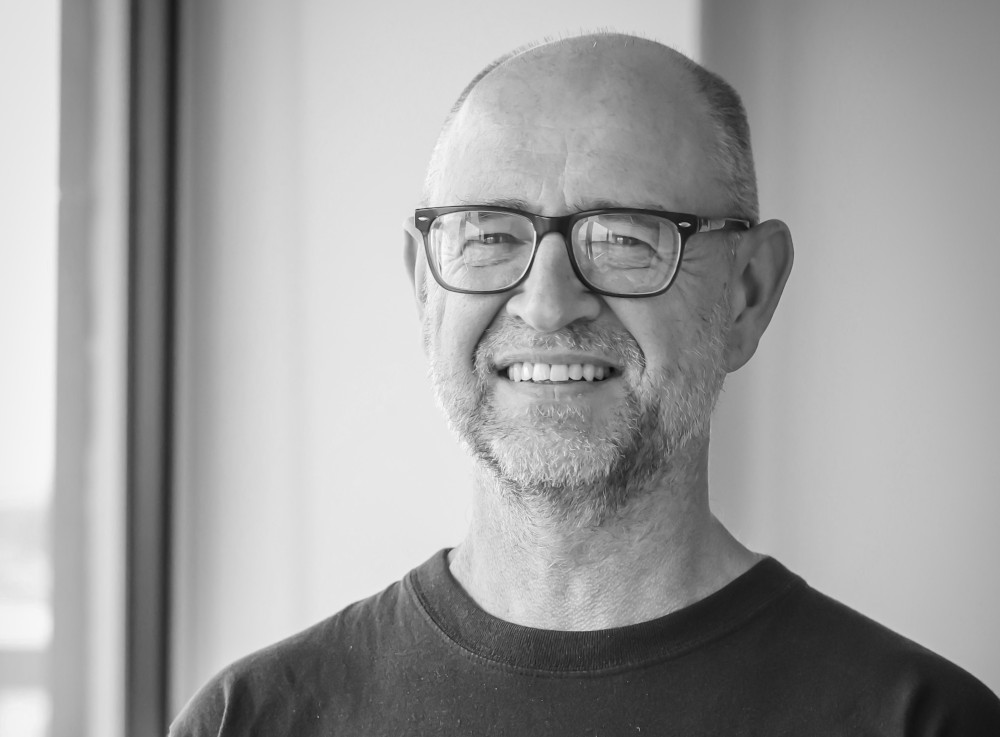
Image by Ansel Basiloy.
How on earth to interview Michael Farrell? I once introduced Farrell at a reading as one of my ‘top five dead or alive’ Australian poets. I still believe this to be true. I once watched him eat a falafel during the open mic section of a poetry reading in Sydney. Once, while driving the work van, I saw Farrell on the way to the pool and honked the horn, realising later he’d have no idea it was me. What does this all mean? Farrell’s latest book is Googlecholia (2022) and the one before that was Family Trees (2020). These are the ones we talk about. They are both very, very good. Farrell’s work is expansive. It’s funny and sweet and tough and tender.
Farrell is a friend of mine, but also the horizon that I will spend my entire poetry ‘career’ trying to catch up to. His work, I think, is of national significance. Are we ready for that conversation? So, when tasked with interviewing someone whose work I admire so deeply, and who I care for dearly as a friend, I kind of wigged out and began by asking about breakfast.
Harry Reid: Hello M, I have been thinking hard about what I would like to know about you, and I have been caught on this idea of your morning routine. So, what does Michael Farrell eat for breakfast? You’ve told me you’ve been ‘getting into’ cafes recently.
Michael Farrell: Rather than give you an image of my morning routine, I will tell you what breakfasts stand out. Before muesli made it to Bombala, I especially remember cornflakes with banana, rice bubbles with a side of cold roast lamb, and leftover curry on toast (probably beef). There was a long period in my early 20s when I had a peanut butter and sultana sandwich every morning. Ideally from a packet loaf of grainy whole meal, that you can’t buy anymore (this was in Canberra btw). In the last few years (pre and post a sick period where I only had cooked apple with a soaked walnut) I alternate a kind of scratch muesli, with toast and a jam rotation. I almost always have vegemite (a class leveller?) and honey also. Beverage-wise, it used to be black tea, but this year (2023; after a 25-year break from coffee), I started to go out to cafes to read before breakfast. I rarely eat, but I get a strong latte or a batch brew. I normally go to Gabriel or Burnside (now I’ve moved to Carlton it’s Brunetti or Vincent the Dog). I adopted some new favourites in Sydney recently (e.g. Outfield in Ashfield). In case anyone cares, I have full cream dairy when I have milk, though am inclined to have hot water and peanut butter with muesli.
HR: Rice Bubbles with a side of cold roast lamb makes a lot of sense to me. Peanut butter and sultanas, maybe less so but I can see a young Michael Farrell in the kitchen putting that together. Was a young Michael Farrell writing poetry? Who were you reading eating peanut butter and sultana sandwiches in the 90s? It’s easy to compare the ode ode (2002) poems to now and clock it as ‘earlier’ work when read alongside Family Trees or Googlecholia but it certainly doesn’t feel like a first book – it’s straight out the gate with a very distinct style / ‘poetick’.
MF: This was the late 80s, not the 90s. I forget what I was reading mostly. A lot of fiction. Tom Robbins, James Joyce’s Ulysses, Sylvia Plath’s The Bell Jar, Jean-Paul Sartre’s Roads to Freedom trilogy. Also, drama: Shakespeare, some Greek, Edward Albee, and notably German expressionist plays. Then at some point around 1989-90, I stumbled on Frank O’Hara and Gertrude Stein, and then language poetry.
The poems in ode ode start from 1996. I had previous manuscripts. I’d tried the Five Islands ‘New Poets’ series, I was longlisted one year and would have gone to the Varuna workshop, but my work didn’t let me (I was working for Centrelink at the time). I tried publishers like Pariah and Black Pepper, too. None of those poems went into ode ode. I’d been writing poems pretty solidly from 1990-95, with a few publications in magazines, like Otis Rush, Meanjin, Verandah and Island. A few other smaller ones have disappeared.
The ode ode poems reflect Frank O’Hara and John Ashbery to some extent, as well as Wallace Stevens and Marianne Moore (the more extreme langpo poems I’d already left behind), and the influence of electronic music – the sampling/collage that was big in the early 90s.













